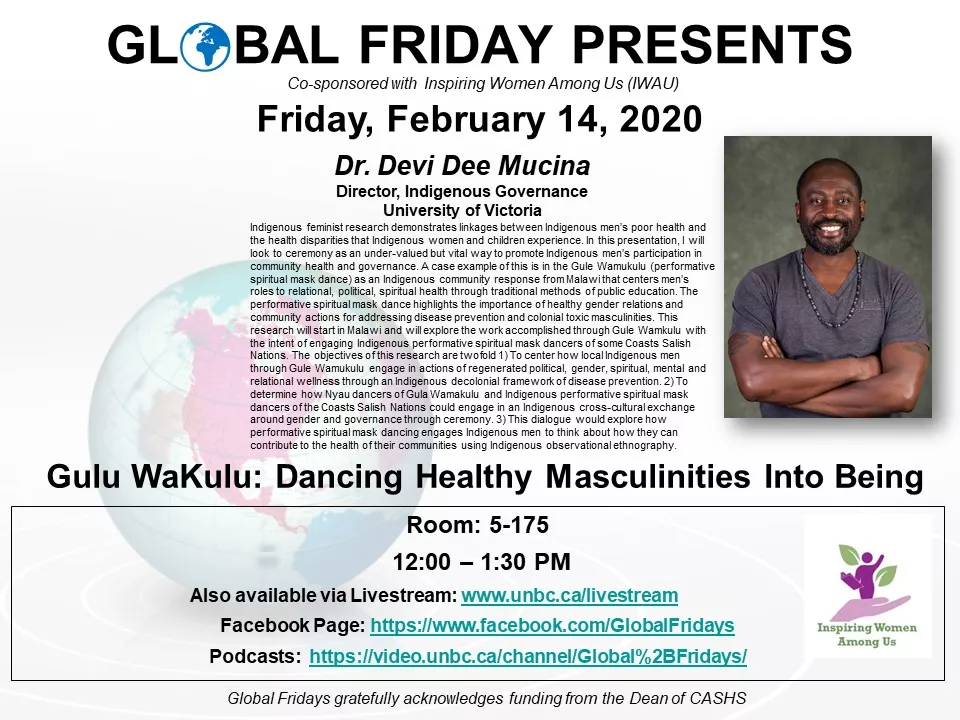Gulu WaKulu: Dancing Healthy Masculinities Into Being

Global Friday Presents
Co-sponsored with Inspiring Women Among Us (IWAU)
Dr. Devi Dee Mucina
Director, Indigenous Governance
University of Victoria
ABSTRACT: Indigenous feminist research demonstrates linkages between Indigenous men’s poor health and the health disparities that Indigenous women and children experience. In this presentation, I will look to ceremony as an under-valued but vital way to promote Indigenous men’s participation in community health and governance. A case example of this is in the Gule Wamukulu (performative spiritual mask dance) as an Indigenous community response from Malawi that centers men’s roles to relational, political, spiritual health through traditional methods of public education. The performative spiritual mask dance highlights the importance of healthy gender relations and community actions for addressing disease prevention and colonial toxic masculinities. This research will start in Malawi and will explore the work accomplished through Gule Wamkulu with the intent of engaging Indigenous performative spiritual mask dancers of some Coasts Salish Nations. The objectives of this research are twofold 1) To center how local Indigenous men through Gule Wamukulu engage in actions of regenerated political, gender, spiritual, mental and relational wellness through an Indigenous decolonial framework of disease prevention. 2) To determine how Nyau dancers of Gula Wamakulu and Indigenous performative spiritual mask dancers of the Coasts Salish Nations could engage in an Indigenous cross-cultural exchange around gender and governance through ceremony. 3) This dialogue would explore how performative spiritual mask dancing engages Indigenous men to think about how they can contribute to the health of their communities using Indigenous observational ethnography.
BIO: Dr. Devi Mucina is an Assistant Professor in the Indigenous Governance Program at the University of Victoria, with expertise in Indigenous knowledge systems and Indigenous masculinities. His academic interests and current research work focus on Indigenous men with reference to Indigenous men and fathering beyond imposed colonial masculinities; Indigenous men in elite sports; and contemplating how Indigenous spiritual mask dancing shapes Indigenous masculinities. As an Ubuntu African, Devi’s scholarship is guided by Indigenous Ubuntu philosophies, which convey that a person is a person only through their relationships with others, while being cognizant of the kinds of relational bonds that materialize through one’s access to structural and political power. His scholarly interest in Indigenous masculinities has led him to his current research projects: Researching how Gule Wamukulu (performative spiritual mask dancing) and Ngoni dances are tools of Indigenous resurgence in the revival of decreased involvement of men in the labour of relational community health. At the center of this research are questions about how Indigenous communities are renewing and decolonizing Indigenous masculinities by grounding holistic relational engagements with intimate partners, families, communities, lands and bodies of waters. His other research explores the impact of parental and familial members’ incarceration on their children and questions the risk factors this creates for their future incarceration from an Indigenous intersectional theoretical framework.
Also available via Livestream
Global Friday gratefully acknowledges funding from the Dean of CASHS.